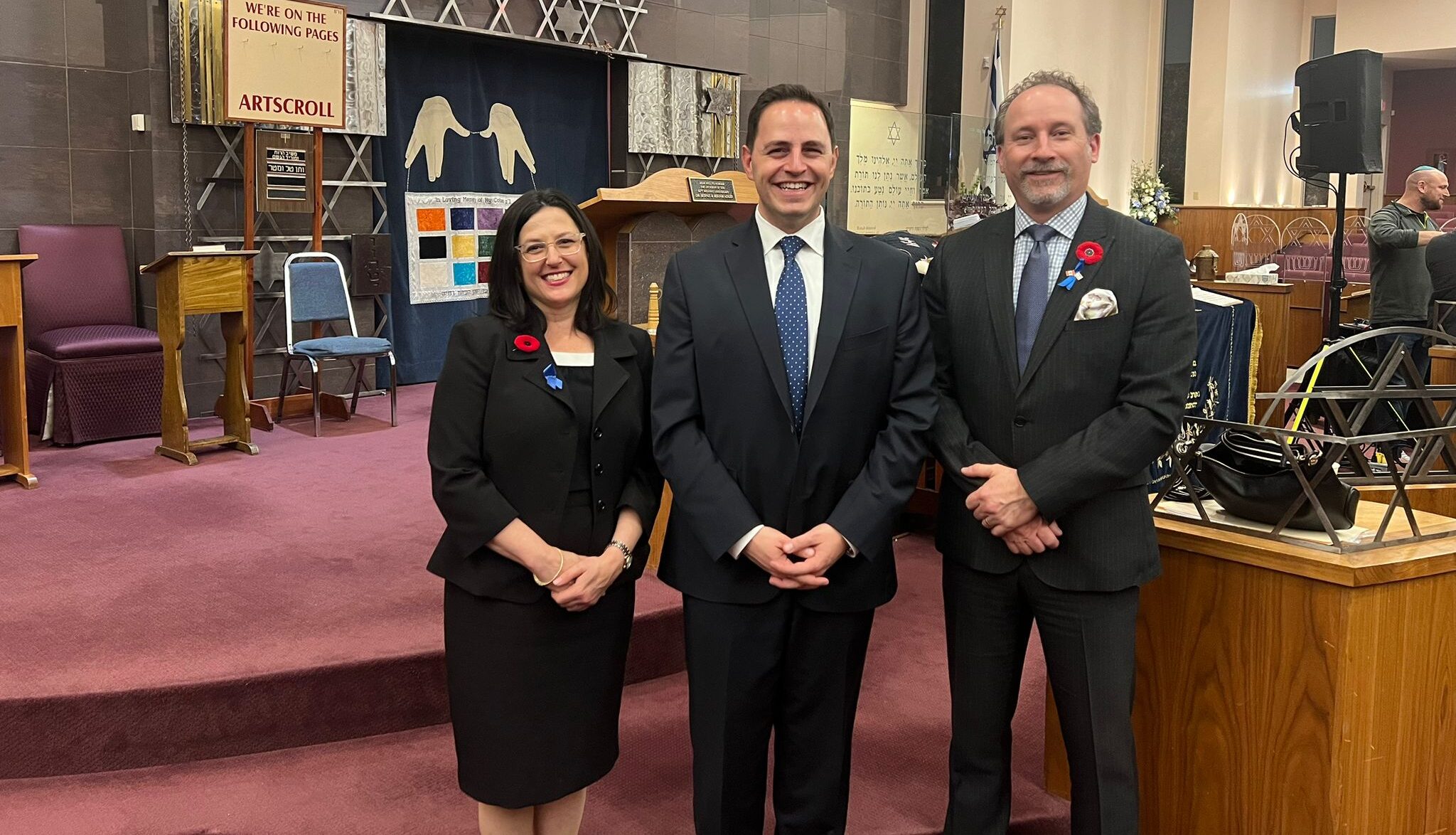The government of Alberta announced Nov. 9 that it would make Holocaust education mandatory in the province’s new social studies curriculum. Alberta now becomes the third province, after Ontario and British Columbia, to mandate Holocaust education.
“I firmly believe we must do everything possible to combat rising antisemitism and educate young Albertans about the horrors of the Holocaust. Ensuring all students learn from one of history’s darkest chapters will help us confront hate and prevent similar atrocities from occurring,” said Alberta Education Minister Demetrios Nicolaides.
The minister made the announcement ahead of a ceremony to commemorate Kristallnacht at Beth Israel Synagogue in Edmonton, where he was joined by members of both the Edmonton and Calgary Jewish communities.
Also known as “the Night of Broken Glass,” Kristallnacht took place on the night of Nov. 9, 1938. The Nazi parties in Germany, Austria and Czechoslovakia encouraged violent mobs to attack Jews and Jewish property including synagogues, Jewish businesses and homes.
Alberta’s official opposition party, the NDP, also backed the announcement. Education critic Rakhi Pancholi stated that in 2018, when the NDP was in power, it began the process of expanding Holocaust education in the province.
“Combating hate begins with education. We must never forget where the propagation of hatred and bigotry lead,” she said.
The Alberta government says it plans to begin a public engagement process early in 2024 when residents of the province will have the opportunity to provide feedback on the K-12 social studies curriculum. At present, Grade 11 students in Alberta examine ultra-nationalism as a cause for genocide, including some study of the Holocaust.
The news followed months of consultation between the Alberta government and Jewish groups, both national and provincial. Jewish organizations were quick to praise Alberta as a leader in standing up against hate, especially antisemitism. In September 2022, Alberta adopted the International Holocaust Remembrance Alliance definition of antisemitism.
The leaders of the Jewish Federation of Edmonton and the Calgary Jewish Federation said they look forward to contributing to the development and implementation of the new academic material. Both Jewish federations have been providing educational opportunities and programs about the Holocaust for over 20 years.
“This announcement comes at a time when antisemitism has spiked across Canada and around the world. It is crucial that the next generations learn about how hate surfaces,” said Stacey Leavitt-Wright, CEO of the Jewish Federation of Edmonton. “Whether it’s distortion of Holocaust history or misinformation about Hamas’ terrorist attacks, both are rooted in antisemitism.”
“Creating an anti-racist society starts at the school-age level and Holocaust education is an important tool in helping our students learn about the underlying ramifications of prejudice, racism and stereotyping,” said Adam Silver, CEO of Calgary Jewish Federation.
The Centre for Israel and Jewish Affairs also commended the news, thanking Premier Danielle Smith and the Alberta government for supporting the Jewish community and fighting antisemitism and hate. CIJA CEO Shimon Koffler Fogel said, “Education is crucial to ensuring our children learn the lessons of the past and are equipped to stand up against hate today. Implementing mandatory Holocaust education will create a safer Alberta for all.”
On Oct. 30, British Columbia Premier David Eby announced the inclusion of mandatory Holocaust education in the province’s K-12 curriculum starting in the fall of 2025.
Last year, Ontario Education Minister Stephen Lecce introduced a mandatory learning requirement regarding the Holocaust for the province’s Grade 6 curriculum.
On Nov. 1, Lecce unveiled plans to expand Holocaust education in Ontario’s Grade 10 curriculum. The province has also supported the development of Unlearn It, a free, bilingual online resource hub for educators and parents to support children in grades 6-8 in learning about antisemitism, how to identify it and act to address it.
B’nai Brith Canada had been urging more provinces to follow Ontario and British Columbia’s lead—as Alberta has now done–particularly with the upsurge in antisemitic incidents following the Hamas attack on Israel on Oct. 7.
Across Canada, provinces have been teaching Holocaust education to some extent, according to Marvin Rotrand, national director for B’nai Brith Canada’s League for Human Rights. However, it is often inadequate in an age when a lot of young people receive their information from social media. In Quebec, for example, Holocaust education is an elective.
Rotrand pointed out that other provinces are examining ways to incorporate more Holocaust education into their curricula.
“Education ministers are coming to the realization that better Holocaust education is absolutely needed and will have an impact on reducing antisemitic incidents,” he said.
Rotrand told The CJN that B’nai Brith has met with several education ministers as well as civil servants responsible for curriculum in their provinces.
“In every case, we have been told that there is a need to plug gaps in the curriculum in various provinces and that there is the political will to do so.”
Prior to Manitoba’s election on Oct. 3, the province’s three leading parties expressed a commitment to strengthening Holocaust education.
In New Brunswick, the office of Education Minister Bill Hogan has partnered with the Atlantic Canada Holocaust Education Foundation, and will look into establishing a Holocaust education advisory committee.
